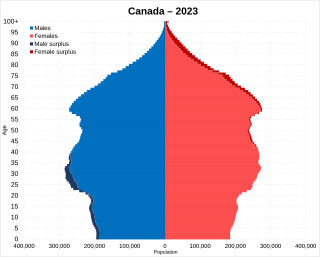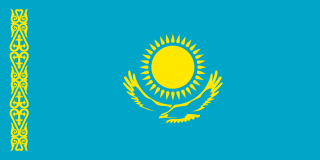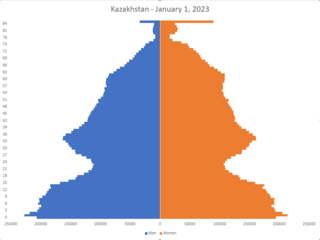Related Research Articles

Statistics Canada conducts a country-wide census that collects demographic data every five years on the first and sixth year of each decade. The 2021 Canadian census enumerated a total population of 36,991,981, an increase of around 5.2 percent over the 2016 figure. It is estimated that Canada's population surpassed 40 million in 2023 and 41 million in 2024. Between 1990 and 2008, the population increased by 5.6 million, equivalent to 20.4 percent overall growth. The main driver of population growth is immigration. Between 2011 and May 2016, Canada's population grew by 1.7 million people, with immigrants accounting for two-thirds of the increase.

Kazakhstan, officially the Republic of Kazakhstan, is a landlocked country mostly in Central Asia, with a part in Eastern Europe. It borders Russia to the north and west, China to the east, Kyrgyzstan to the southeast, Uzbekistan to the south, and Turkmenistan to the southwest, with a coastline along the Caspian Sea. Its capital is Astana, while the largest city and leading cultural and commercial hub is Almaty. Kazakhstan is the world's ninth-largest country by land area and the largest landlocked country. It has a population of 20 million and one of the lowest population densities in the world, at fewer than 6 people per square kilometre. Ethnic Kazakhs constitute a majority, while ethnic Russians form a significant minority. Officially secular, Kazakhstan is a Muslim-majority country, although ethnic Russians in the country form a sizeable Christian community.

The demographics of Kazakhstan enumerate the demographic features of the population of Kazakhstan, including population growth, population density, ethnicity, education level, health, economic status, religious affiliations, and other aspects of the population. Some use the word Kazakh to refer to the Kazakh ethnic group and language and Kazakhstani to refer to Kazakhstan and its citizens regardless of ethnicity, but it is common to use Kazakh in both senses. It is expected that by 2050, the population will range from 23.5 to 27.7 million people.

The economy of Kazakhstan is the largest in Central Asia in both absolute and per capita terms. In 2021, Kazakhstan attracted more than US$370 billion of foreign investments since becoming an independent republic after the collapse of the former Soviet Union.

Foreign relations of Kazakhstan are primarily based on economic and political security consideration. The Nazarbayev administration has tried to balance relations with Russia and the United States by sending petroleum and natural gas to its northern neighbor at artificially low prices while assisting the U.S. in the War on Terror. Kazakhstan is a member of the United Nations, Collective Security Treaty Organization, Organization for Security and Co-operation in Europe, North Atlantic Cooperation Council, Commonwealth of Independent States, the Shanghai Cooperation Organisation, and NATO's Partnership for Peace program. Kazakhstan established a customs union with Russia and Belarus which eventually became the Eurasian Economic Union. President Nazarbayev has prioritized economic diplomacy into Kazakhstan's foreign policy.

Astana, previously known as Akmolinsk, Tselinograd, Akmola, and most recently Nur-Sultan, is the capital city of Kazakhstan.

Almaty, formerly known as Alma-Ata, is the largest city in Kazakhstan, with a population of over two million. It was the capital of Kazakhstan from 1929 to 1936, while the country was an autonomous republic of the Soviet Union, then from 1936 to 1991, a union republic and finally from 1991, an independent state. In 1997, the government relocated the capital to Akmola.

The Kazakhs are a Turkic ethnic group native to Central Asia and Eastern Europe, mainly Kazakhstan, but also parts of northern Uzbekistan and the border regions of Russia, as well as northwestern China and western Mongolia. The Kazakhs arose from the merging of the medieval tribes of Turkic and Mongolic origin in the 15th century.

Human rights in Kazakhstan are uniformly described as poor by independent observers. Human Rights Watch says that "Kazakhstan heavily restricts freedom of assembly, speech, and religion. In 2014, authorities closed newspapers, jailed or fined dozens of people after peaceful but unsanctioned protests, and fined or detained worshipers for practicing religion outside state controls. Government critics, including opposition leader Vladimir Kozlov, remained in detention after unfair trials. Torture remains common in places of detention."

FC Kaysar is a Kazakh professional football club based in the Gany Muratbayev Stadium in Kyzylorda. They are founding members of the Kazakhstan Premier League and have missed only three seasons following relegations. Their most successful was the season of 1998, where they won the Kazakhstan Cup and came fourth in the league. Also they won Kazakhstan Cup in 2019.

Pavlodar Region is a region of Kazakhstan. The population of the region was 742,475 ; and 806,983 .; the latest official estimate was 756,511. Its capital is the city of Pavlodar, which had a population of 360,014 at the start of 2018. Many people, especially Ukrainians, migrated to Pavlodar in Nikita Khrushchev's Virgin Lands Campaign.

Borat! Cultural Learnings of America for Make Benefit Glorious Nation of Kazakhstan, or simply Borat, is a 2006 mockumentary black comedy film directed by Larry Charles and starring Sacha Baron Cohen. Baron Cohen plays the leading role of Borat Sagdiyev, a fictional Kazakhstani journalist who travels through the United States to make a documentary which features real-life interactions with Americans. Much of the film features unscripted vignettes of Borat interviewing and interacting with real-life Americans who believe he is a foreigner with little or no understanding of American customs. It is the second of four films built around Baron Cohen's characters from Da Ali G Show (2000–2004): the first, Ali G Indahouse, was released in 2002, and featured a cameo by Borat; the third, Brüno, was released in 2009; and the sequel to Borat, Borat Subsequent Moviefilm, was released in 2020.
Energy in Kazakhstan describes energy and electricity production, consumption and import in Kazakhstan and the politics of Kazakhstan related to energy.
According to various polls, the majority of Kazakhstan's citizens, primarily ethnic Kazakhs, identify as Sunni Muslims. In 2020, Shia Muslims made up 0.55% of the population.

Astana Football Club is a professional football club based in Astana. They play in the Kazakhstan Premier League, the highest level of Kazakh football. The club's home ground is the 30,254-seat Astana Arena stadium. The club colours, reflected in their badge and kit, are sky blue and yellow. Founded as Lokomotiv Astana in 2009, the club changed its name to Astana in 2011.

Football Club Aktobe, commonly referred to as FC Aktobe or simply Aktobe, is a professional football club based in Aktobe. They last played in the Kazakhstan Premier League, the highest level of Kazakh football. Formed as Aktyubinets in 1967, they became Aktobemunai in 1996, Aktobe in 1997, Aktobe-Lento in 2000 and finally Aktobe again in 2005. Their home ground is the 13,500 seat Central Stadium.

The Kazakhstan–Russia border is the 7,644-kilometre (4,750 mi) international border between the Republic of Kazakhstan and the Russian Federation. It is the longest continuous international border in the world and the second longest by total length, after the Canada–United States border. It is in the same location as the former administrative-territorial border between the Kazakh Soviet Socialist Republic and the Russian Soviet Federative Socialist Republic.

The Georgian diaspora refers to both historical and present emigration from Georgia. The countries with the largest Georgian communities outside Georgia are Turkey and Russia. The Georgian diaspora, or the dispersion of Georgian people outside of Georgia, began to take shape during various historical periods. However, a significant wave of emigration occurred during the 19th and 20th centuries, particularly during times of political upheaval, such as the Russian Empire's expansion into the Caucasus region and the Soviet era.
Azerbaijanis in Kazakhstan are part of the Azerbaijani diaspora. They are Kazakh citizens and permanent residents of ethnic Azerbaijani background. According to the 2009 census, there were 85,292 ethnic Azerbaijanis living in Kazakhstan; Azerbaijanis comprised 0.5% of Kazakhstan's population and were the country's tenth-largest ethnic minority.

Älihan Ashanuly Smaiylov is a Kazakh politician who served as the prime minister of Kazakhstan from 2022 to 2024. Previously, he served as the First Deputy Prime Minister of Kazakhstan under Askar Mamin. He at the same time served as the Minister of Finance from September 2018 until May 2020. Smaiylov was nominated as the new prime minister of Kazakhstan by the country's president following the 2022 Kazakh protests. His candidacy was unanimously approved by the country's parliament. Since January 2023, he has been Chairman of the Board of Directors of the JSC National Welfare Fund Samruk-Kazyna.
References
- ↑ Statistics Canada. "2016 Census Profile, 2016 Census" . Retrieved 18 February 2020.
- ↑ "Итоги национальной переписи населения 2009 года (Summary of the 2009 national census)" (in Russian). Agency of Statistics of the Republic of Kazakhstan. Archived from the original on 12 June 2013. Retrieved 21 May 2013.
- ↑ Statistics Canada. "2016 Census Profile, 2016 Census" . Retrieved 18 February 2020.
- ↑ "kazakh.ca". Archived from the original on 2018-06-29. Retrieved 2014-09-30.